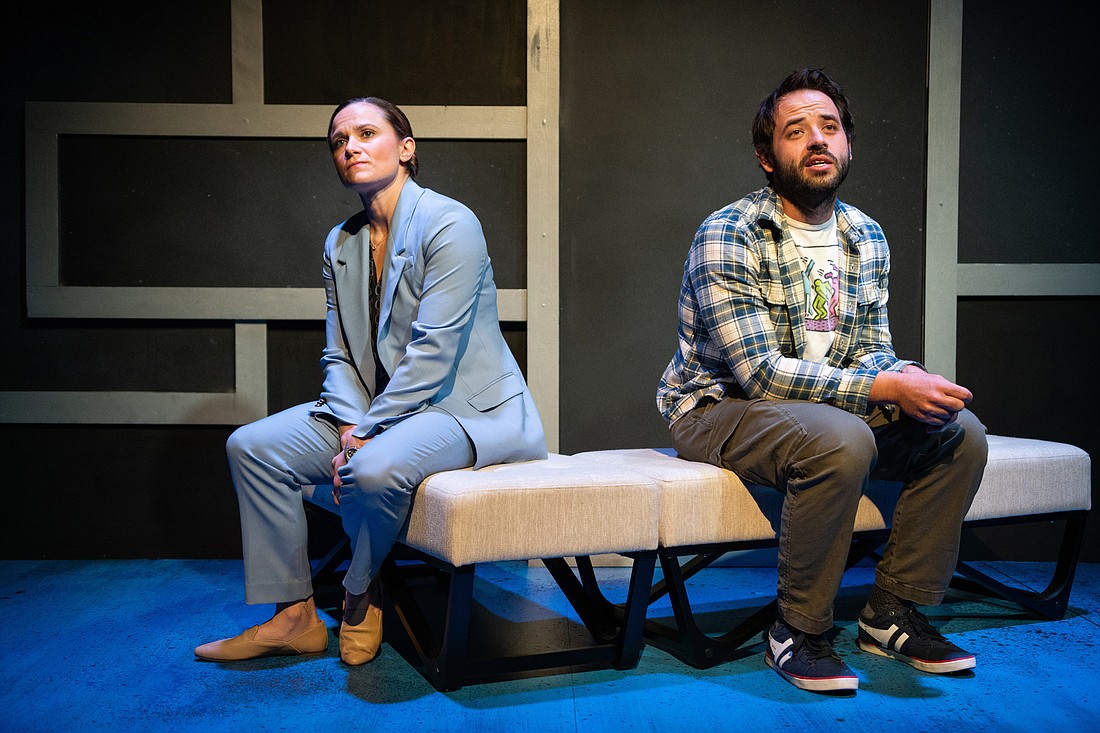- May 4, 2024
-
-
Loading

Loading

Matt Schatz’ “The Burdens” shares the ongoing dialogue of two siblings about “Zad Zad,” their unbearable grandfather.
Since they live on opposite sides of the country, that conversation is long-distance.
They communicate by text, email, and occasionally voicemail. Lately, they’ve got a lot to talk about.
Jane (Morgan Lavenstein) is a high-powered attorney and mother of three (with one more on the way) based in New Jersey. Her younger brother, Mordy (Jake Fallon), is a wannabe rock star living in L.A.
The only gigs he gets are open-mic nights; he pays the rent with a part-time job as a pharmacist’s assistant.
They’re both unhappy that their 100-year-old grandfather is putting their widowed mother (aka “Mommy”) through hell.
Zad Zad’s draining her financial resources, breaking her heart, and calling her names we can’t print in a family newspaper.
How can her kids possibly help?
This dilemma emerges in the siblings’ fragmented texts. Thanks to a random typo, a potential (if illegal and immoral) solution pops up. Jane wishes that Zad Zad appreciated their mommy.
Mordy replies, “I hope he dies.”
He’d meant to type, “I hope he does.” But Jane takes his mistake seriously at first.
After a good laugh, the siblings begin to think the unthinkable. Their dark “what-if” fantasy for Zad Zad’s final exit slowly turns into a plan. Mordy’s pharmaceutical expertise comes in handy. (Supposedly, a kale smoothie can be fatal to people on blood thinners.) Jane’s closest to Zad-Zad’s nursing home. And she’s got a blender.
The plot takes several left turns after that. Do the kids kill Zad Zad or not? Don’t ask me; and that’s not really the point.
The playwright’s more interested in alienated family relationships — and not just Mordy and Jane. You see the siblings on stage. Thanks to their texts, you see Mommy, Zad Zad, and Jane’s husband and kids in your mind’s eye.
Director Brendan Ragan brings this fractured fairy tale to life with pitch-perfect pacing.
The music of Schatz’ comedic dialogue is first-rate. It’s not really natural speech, but it sounds like it. And it never settles into predictable set-up/punch line beats. Ragan hears the music.
Jane (Lavenstein) and Mordy (Fallon) put the “fun” in dysfunctional family in this dark comedy. Their murder plot comes together like an improv game. (“Yes, and … here’s how we’ll kill him!”) They stumble onto the scheme by a process of free association. As preposterous and unethical as it is, the siblings’ runaway train of thought also reveals who they are.
As with many stage plays, most action happens off-stage. You hear what happen in anecdotes, family stories and snippets of dialogue. That’s true in “The Burdens,” but with a difference.
As noted, the siblings’ text and emails comprise the play’s dialogue. These messages don’t pop up on various screens.
The two actors face the audience. They speak their texted lines to us — and not each other.
The effect is as creepy as an old “Outer Limits” episode. It also violates every basic lesson in Acting 101.
Actors typically play off each other. In this play, they’re on their own.
What’s the playwright’s point?
A jab at modern communication is the obvious takeaway. Digital tech connects us. And simultaneously disconnects us. We talk, but we don’t really talk. “People talking without speaking,” to quote Paul Simon’s “Sounds of Silence.”
This production smartly evokes that digital divide.
Tom Hansen’s maze-like set design and Ethan Vail’s on-again, off-again lighting conveys the disjointed lack of context of each scene. Alison Gensmer’s costumes are visible to the audience, not the two characters.
(Mordy definitely doesn’t think he’s being watched.)
Alex Pinchin’s sound design interweaves the beeps, bloops and chimes of today’s chatty smartphones and computers.
Smartphone stupidity is definitely one of Schatz’ satirical targets.
But it’s not his only target. He also takes aim at the old-fashioned, hurtful stupidity of many human families.
Aside from its 21st-century medium, the play’s message is pretty clear. Fathers, mothers, sisters and brothers can play mind games on each other, and those games can sometimes be cruel. Jane and Mordy’s childhood memories of their grandfather boil down to a series of snubs and insults. Zad Zad’s past hurts still sting; his present-day cruelties do, too.
It’d be easy to dismiss the man as a rotten human being. Zad Zad sometimes was (and sometimes is) rotten indeed.
But he’s more than that. That’s the reason Mordy and Jane still love him even though they still want to kill him.
That’s my takeaway.
But it’s the 21st century, and the signal noise can be murderous.
I’ll let you make the call.